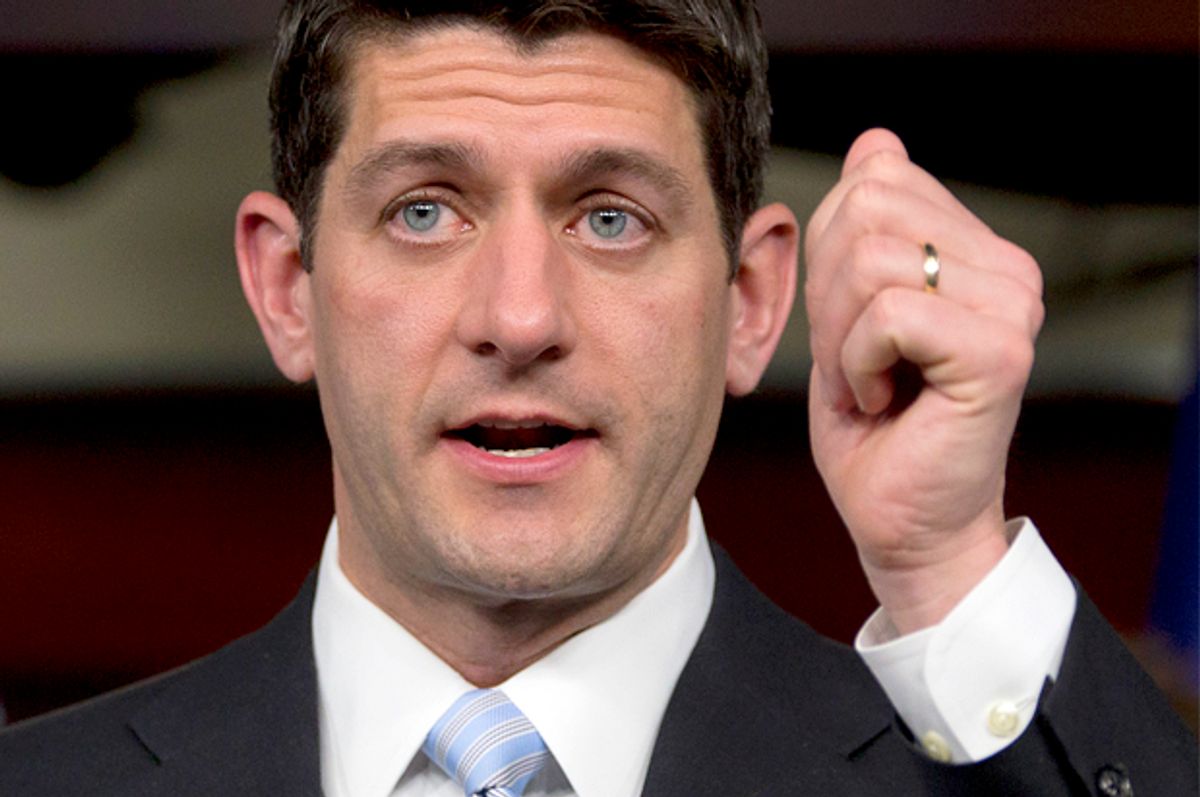I’m not someone who saw a silver lining in Democrats losing the Senate. But if there is one, it may lie in letting Republicans lay out their wildly unpopular plans for “governing.”
As if walking into a trap set by the other party – except Democrats are too broken to set traps right now -- GOP congressional leaders are promising to act immediately on their budget-slashing ideas when 2015 begins. High on their list, according to the New York Times, is implementing Rep. Paul Ryan’s plan to “overhaul” Medicare by replacing it with “premium support” vouchers designed to privatize the system over the coming decades. They will also form a commission to examine “options” for Social Security, which Ryan has also long favored privatizing.
The GOP won voters over 65 by 16 points last week. Culture and conservatism may keep most of those voters Republican, but if congressional conservatives go along with those plans, Democrats might have a shot at them.
That the GOP will move against Medicare still isn’t a done deal. The House will do it, of course, because the House has passed the Ryan budget before. In the Senate, the plan will face a warm reception from incoming budget committee chairman Sen. Jeff Sessions of Alabama, an advocate of the Ryan budget. Still, Mitch McConnell may have problems inflicting such an unpopular plan on vulnerable GOP senators up for reelection in 2016. It will make it difficult for Karl Rove to make Democrats the party that is menacing Medicare if Republicans in both houses of Congress vote to voucherize it.
Yet even some blue-state Republicans say they’re on board with the Ryan-crafted budget blueprint. “I’m quite comfortable with the reforms contemplated in those budgets,” Pennsylvania Sen. Pat Toomey told the Times. “There are no political implications that I’m thinking about.” The Times notes that the last time the Ryan budget faced the Senate, five Republicans voted against it – including Sen. Ted Cruz, who thought it didn’t go far enough. But at least four new GOP senators, including Colorado’s Cory Gardner and Tom Cotton of Arkansas, are on record supporting it.
The plan also calls for capping and block granting Medicaid. Democrats and advocates haven’t done as good a job defending Medicaid as Medicare, but both are programs that mostly serve elderly and disabled people – 20 percent of Medicaid spending goes to in-home and supportive care for seniors, and two-thirds of spending overall goes to seniors and the disabled.
Republicans say their plan is a balanced budget over the next 10 years, though the president may be on track to get there sooner. The deficit has already fallen from $1.4 trillion in 2009 to $483 billion this year – or, as the Times puts it, from 10 percent of the economy to 2.8 percent. Their task will be made tougher, of course, by their plan for more tax cuts on corporations and the very wealthy.
As always, roughly a quarter of the cuts in the budget will hit programs for the poor, slashing food stamps, social services block grants and health programs for children. “Real people will get hurt,” says Maryland Democrat Rep. Chris Van Hollen. Sadly, those cuts may not face as much opposition as changes to Medicare.
But Republicans are clearly interpreting last week’s historically low-turnout election – 38 percent of eligible voters showed up -- as a mandate for slashing government. It’s going to be a long two years before voters can tell them what they think about it.

Shares